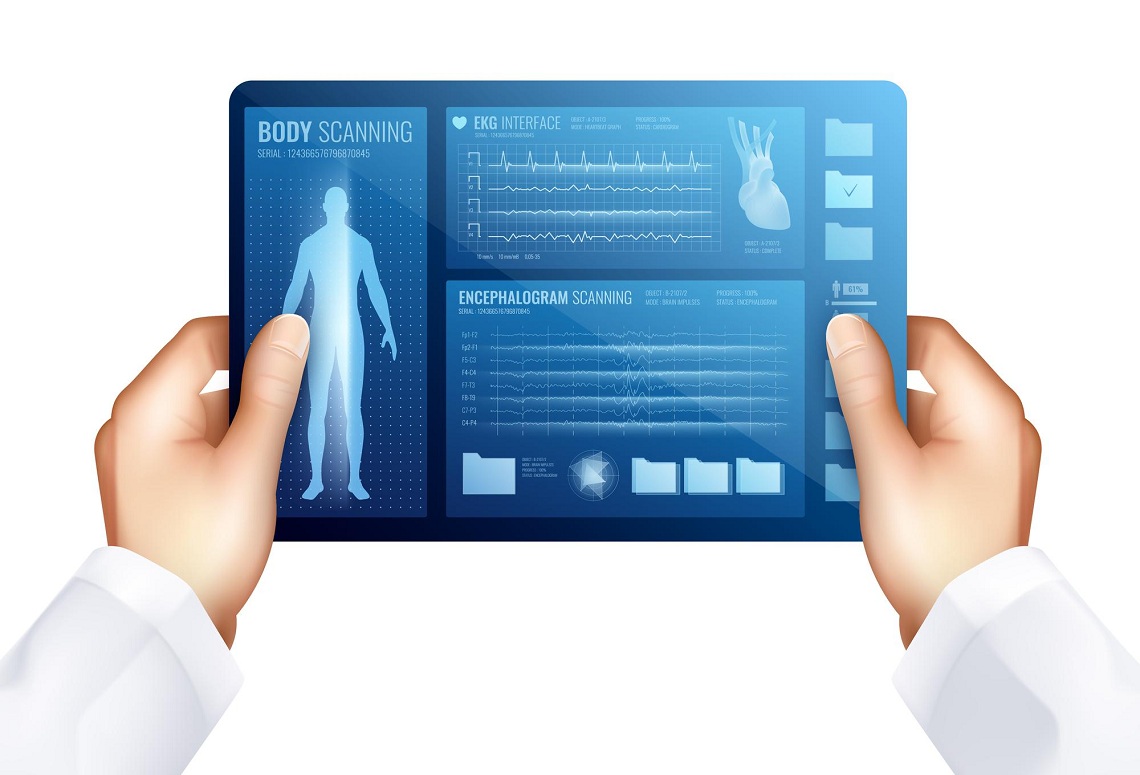The advancement in several technologies led different sectors of the economy to the path of growth, development, and improvement. Modern technologies, especially Artificial Intelligence (AI) have transformed the overall working of different sectors, declining its cost, expenses, and other factors that act as barriers in its growth. When we talk about the technologies, then AI is considered as the most popular topic to have words about. AI plays a crucial role in industries, and now it takes a step forward, playing a role in the healthcare sector as well.
According to Frost & Sullivan, a market research company, they cleared that Artificial Intelligence (AI) is expected to be a $6 billion industry by 2021. Another study by McKinsey shows that the healthcare sector will be listed in one of the top five industries that would have a high involvement in AI. Such predictions and data by experts show that AI is a game-changing technology that will benefit the healthcare industry to a great extent in the future. Before we discuss more the future of artificial intelligence, let’s start with what AI means.
What is AI?
Artificial intelligence enables machines to think and act like humans. This renowned concept was first introduced in 1927 but conceptualized in the 1950s intending to accomplish the tasks or activities by machines that humans do. Artificial intelligence is also called machine intelligence. Today, the concept of artificial intelligence is adopted by several companies to give the user a better experience. For instance, Facebook uses AI in recognizing the people in an image, whereas Google provides search suggestions. Talking about the healthcare industry, then AI has not made much involvement as compared to other sectors of the economy.
AI is speeding up the growth of the healthcare sector by transforming the complete treatment procedures, providing the patient with a good experience, enhancing the clinician practice & pharmaceutical industry operations. Experts say that AI will surely make a prominent place in healthcare in the coming years, which will decline several treatment risk factors to a great extent, and so is the death rate. In the coming years, the AI involvement in the healthcare sector will be boosted and hence, will start delivering measurable improvements in patient outcomes and operational efficiency.
Why Does the Healthcare Sector Need AI Technology?
Today, artificial intelligence has become a popular topic. According to several reports of medical institutions & experts, AI involvement in the healthcare industry can assist in early disease detection, better diagnosis, advanced treatment procedures, and even outcomes prediction. Even there is a high probability that this technology can replace human doctors and practitioners as well.
If we discuss in brief, then the evolution of AI in healthcare is shaping up the whole system and provides ideal solutions to meet the healthcare needs of the patients quickly.
But the question arises, do we need AI technology in healthcare? Let’s discuss-
The current scenario of this sector will itself answer your question. There is no doubt that this sector faces several daily challenges. We all know that even in the year 2020, many repetitive tasks require human intervention and consume a lot of time & energy of a professional. If these repetitive tasks are accomplished by a machine, the story will change. Right? AI technology will not only remove the burden of work but also make the overall treatment procedure faster.
In today’s fast-paced world, people strive for fast services. Whether it is a favorite dish order in a restaurant or your diabetes report at the hospital, everyone looks for the quick service without compromising the accuracy factor. But there is always a hidden fear inside the patient’s heart if the treatment done by doctors is accurate or not. After all, doctors, medical professionals, and clinicians are humans, and there could be a possibility of errors. But at the same time, such errors are not tolerable. According to a study, it is cleared that misdiagnosing illness & medical errors accounted for 10 percent, which is the rate of all US deaths. This is where artificial intelligence steps to overcome these challenges.
As per the realistic report of WHO, nowadays, cardiovascular diseases are one of the major causes of death, and one can easily conclude it with a WHO’s study that every year, CVDs take around 17.9 million lives. It is a bitter truth. With the assistance of AI technology, such disease can be detected early, and hence the effective treatment can be provided. So, this is also one of the reasons why healthcare service providers are showing their high interest in AI involvement in the healthcare system.
Clinical Applications of AI Today and in the Future
With the development in AI technology, there are several applications also introduced in the market today, or some are awaiting approval. All these applications score good points in terms of improving patient care and saving many lives. If we say clearly, then such applications are pattern recognition, robotics, and natural language processing, which also includes the most advanced speech recognition and translation system. Some of the clinical applications of AI are high in use and sure to make a good impact in various areas of medicine and healthcare in the future. Do you want to know more about such AI apps? Take a look at the below-listed points-
● Virtual Assistants
The first on our list is virtual assistants, which are considered most effective in helping with Alzheimer’s disease. This AI-driven technology can help in accomplishing daily activities such as setting reminders to eat, taking medications, making a cup of coffee, getting dressed, and a lot more daily living things. The perfect example of virtual assistance technology is Amazon Echo Dot, which is undoubtedly one of the best techs that enable us to have more control over life. In the future, this technology will surely reach another level and contribute to the healthcare sector in the best way possible.
● MelaFind
This Melafind AI technology has emerged as the best tool for dermatologists. Now, it has become easier for professionals to evaluate pigmented lesions, analyze the irregular moles, and diagnose skin cancer, melanoma, which is nowadays a serious disease. But at the same time, MelaFind technology is also replacing a biopsy. Medical experts say that it should be done as biopsy helps in early detection & identification of skin diseases.
● Robotic-Assisted Therapy
Will your next doctor be a robot? Whenever we talk about the contribution of robotics-assisted therapy technology in healthcare, then this is one of the most commonly asked questions. The answer is yes, as nowadays, robotics and AI provide complete assistance to patients in their stroke recovery. Not only this, even robotic arms and hand-use digital algorithms are also used to detect the motions. It helps the patients to perform movements. So, it could be a great sign that your next doctor in the future can be a robot.
Final Thoughts
Artificial intelligence is undoubtedly carving a niche in healthcare, introducing the new technologies that are making a positive impact and giving the medical experts, clinicians, and other professionals to rely more on it. Till now, the contribution of AI in his sector is incomparable, and experts are expecting a good growth rate in the future as well.
Author Bio:
 Ravi Sharma, CEO of Webomaze is a highly enthusiastic entrepreneur. He has got a great grip on the idea of effective eCommerce Strategies, SEO processes, and tactics which are vital for virtual exposure. He is a fun-loving person and a keen traveler who always hunts to find adventure in new places.
Ravi Sharma, CEO of Webomaze is a highly enthusiastic entrepreneur. He has got a great grip on the idea of effective eCommerce Strategies, SEO processes, and tactics which are vital for virtual exposure. He is a fun-loving person and a keen traveler who always hunts to find adventure in new places.
Linkedin – https://linkedin.com/in/sharmaravi08
Facebook – https://www.facebook.com/sharmaravi08
Do Note: Pursho acts just as the publisher of this post.







